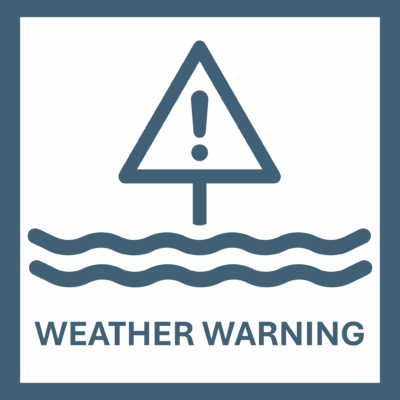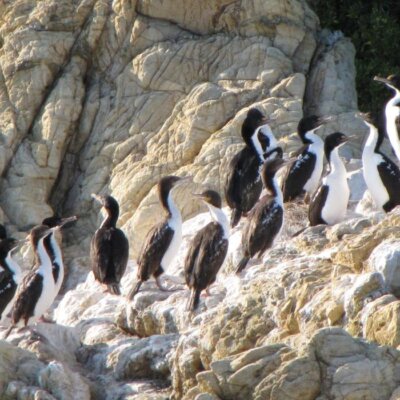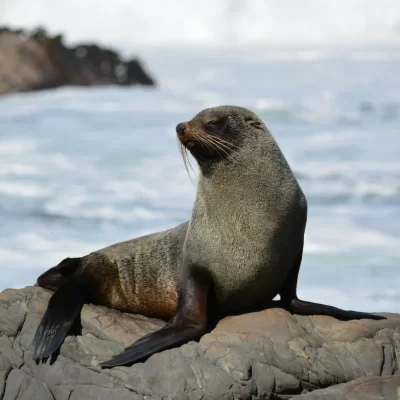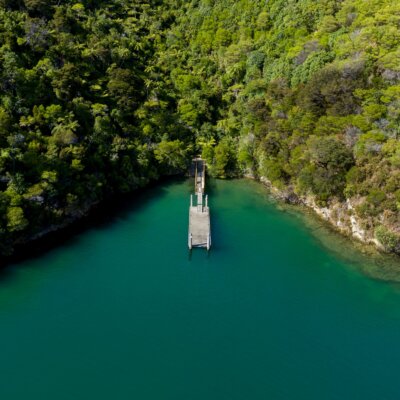Environment
Welcome to Marlborough Sounds Marinas’ Environment page. Our team are proud locals, and are committed to preserving the natural beauty of the Marlborough Sounds. Our focus on sustainability ensures our practices throughout our operations prioritise the kaitiakitanga, or environmental stewardship of our location – where we live, work and play – in the beautiful Marlborough Sounds.
By minimising waste, preventing pollution and protecting the biodiversity of our local area, we put a focus on good environmental practise, and helping our marina users with their environmental responsibilities as well. Join us in our efforts by reading through our information below – and reach out to your friendly marinas team if you have any questions, comments or suggestions.
For further information please consult our Environmental Policy here, or contact our Environmental Manager here.
Discharge of any sewage, rubbish or other pollutant into marina waters is prohibited. See our Marina rules for more information.
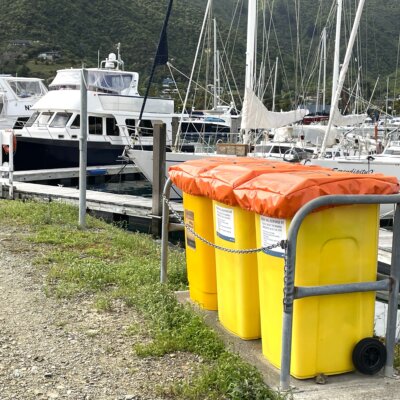 Fuel and Oil Spills
Fuel and Oil Spills
Refuelling at the berth is prohibited. All refuelling must be carried out at the fuel jetty using the dispensers provided.
Most spills in our marinas come from everyday activities such as refuelling, engine emissions and oil leaks. You are responsible for ensuring no spills occur from your activities in our marina.
There are spill kits available on our refuelling jetties in the marina. If you have a spill in the marina, it is imperative you immediately deploy the spill response kit to ensure you contain and clean as much of the spilled substance as possible.
Please let the Marina manager know of any spills.
Handy tips:
- Always refuel at a fuel pump, avoid the use of containers and do not overfill your fuel tanks.
- Ensure you have absorbent material nearby when fuelling or lay it down around the fuelling site.
Interesting fact: A single litre of fuel can contaminate over a million litres of water and form a 4000m2 slick.
Useful information and guidance for pollution prevention can be found in Maritime NZ’s information here: Every Drop Counts
Bilge water 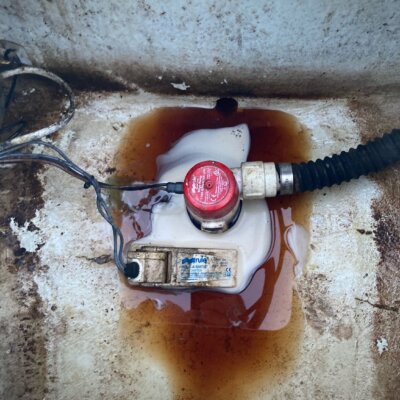
Contaminated bilge water can be a major pollutant in marinas as it usually contains a mixture of contaminants such as engine oil, antifreeze, fuel, and metals. The activation of a bilge pump releases contaminated water into the marine waters and pollutes the natural environment.
If you inadvertently release bilge water clearly contaminated by fuel, oil, antifreeze etc. immediately deploy the spill response kit and notify the marina manager.
Handy tips:
- Keep your bilge clean – regularly use absorbent pads to soak up any oil in your bilge water – this is both a risk to the environment and the safety of people onboard.
- Never mix detergent with oily bilge water; this mixture can be even more toxic than oil alone and is very difficult to clean.
- Keep your oil filters contained while transporting them to the waste facilities.
Sewage management 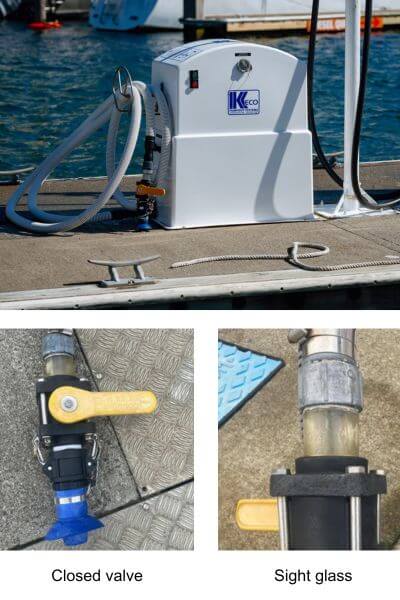
Sewage spills into the marina pose risk to both human and aquatic life. They can be the source of disease outbreaks through direct contact with the water as well as eating shellfish from the contaminated waters.
Pump out facilities are located at the fuel berths at all three marinas in Picton, Waikawa and Havelock, for vessel holding tanks.
10 EASY STEPS TO A SUCCESSFUL SEWAGE PUMPOUT
- Remove the cap from the waste fitting on your deck
- Make sure the valve is closed while system is not in operation (see picture right)
- Turn pump on. If you wish, you can put on a pair of gloves during the pump out procedure
- Insert blue adapter on the end of hose into holding tank outlet
- Hold the hose with a bit of downward pressure to seal around outlet, open valve slowly to operate suction
- When sewage can no longer be seen through hose sight glass (see picture right), close valve and remove hose from holding tank opening
- If desired, rinse holding tank by filling with water and pumping dry. You may want to rinse your tank a few times until the water passing through the sight glass is clear, rinsing helps loosen hard deposits as well as clear any solids clogging the hose
- After you are done pumping out, make sure pump is turned off
- Coil and hang up hose, Help keep area clean and neat for your fellow boaters
- Replace cap on deck waste fitting
Handy tips:
- Use pump out facilities where possible and avoid discharging sewage offshore.
- As a last resort, see Maritime NZ’s guideline, for discharging offshore.
Black/Grey Water
Our primary goal is to reduce the volume of effluents entering local waterways. To support this, we encourage the use of on-shore marina shower facilities and the use of eco-friendly, biodegradable products wherever possible. However, please note that the discharge of sewage (black water) into marina waters is strictly prohibited.
Handy tips:
- When washing the above-water areas of your boat use less cleaning products and more elbow grease.
- Use phosphate-free and biodegradable cleaning products
- Use facilities available on the shore where possible.
Waste management
All our marinas are fitted with adequate waste facilities to fulfil general waste disposal, recycling, aqueous and waste oil needs. We provide rubbish and recycling facilities, as well as some facilities for waste oil, and aqueous waste. If you have any questions about the locations of these facilities, please don’t hesitate to get in touch with the friendly team at your marinas office.
Our marina bins are NOT for public use. The recycling and rubbish facilities provided in the marinas are for marina users and for boat rubbish only.
Household/Bach rubbish needs to be disposed at the Picton or Havelock transfer stations, or at the bins provided by the Marlborough District Council at the breastworks area in Picton Marina (under the coathanger bridge) or by the east side ablutions in Waikawa Marina.

POLLUTION is PROHIBITED in our Marinas. Under the “International Convention for the Prevention of Pollution from Ships” (MARPOL) , the dumping of any plastics into the ocean or navigable waters is PROHIBITED in New Zealand.
Handy tips:
- Bring back what you took out, as well as any rubbish you may have found out there.
- Gut fish and dispose of waste well offshore or consider land disposal. Remember all fish must be landed in a measurable state for MPI checks.
- Avoid the use of plastic bags. Opt. for reusable and recycling options
- DO NOT throw cigarette butts overboard.
Biosecurity
We go beyond the call of duty to protect the Marlborough Sounds Environment from invasive marine pests. All vessels wishing to come into our facilities which have visited Lyttelton harbour/marina, or a port or marina in Tauranga & north, in the past 12 months must comply with the 6 and 1 rule:
We require
- All vessels coming from a high risk area to have been antifouled in the last six months, or lifted and washed in the last month.
- Please take photos of your boat before it goes back in the water, and keep receipts from your haul out or maintenance contractors as evidence
- Make sure your boat is well antifouled to manufacturer’s specifications, and check the hard to reach spots like keelbulbs, props and water intakes carefully.
- For new and returning customers, arrival in our regional waters, your vessel must have no more than light fouling (unless exempt). Light fouling means 1–5% of visible hull surface covered by macrofouling or filamentous algae. Usually the remaining area covered in slime.
Some resources on Marlborough regional biosecurity rules:
- Top of the South Marine Biosecurity Guides here.
- Top of the South rules and requirements here
- Information on invasive organisms here
Good practice in the meantime is to check your anchor, chain, dive gear and fishing gear every time, before you change locations. If you find something that might be a marine pest, don’t put it back in the sea – dispose of it onshore in the rubbish bin.

